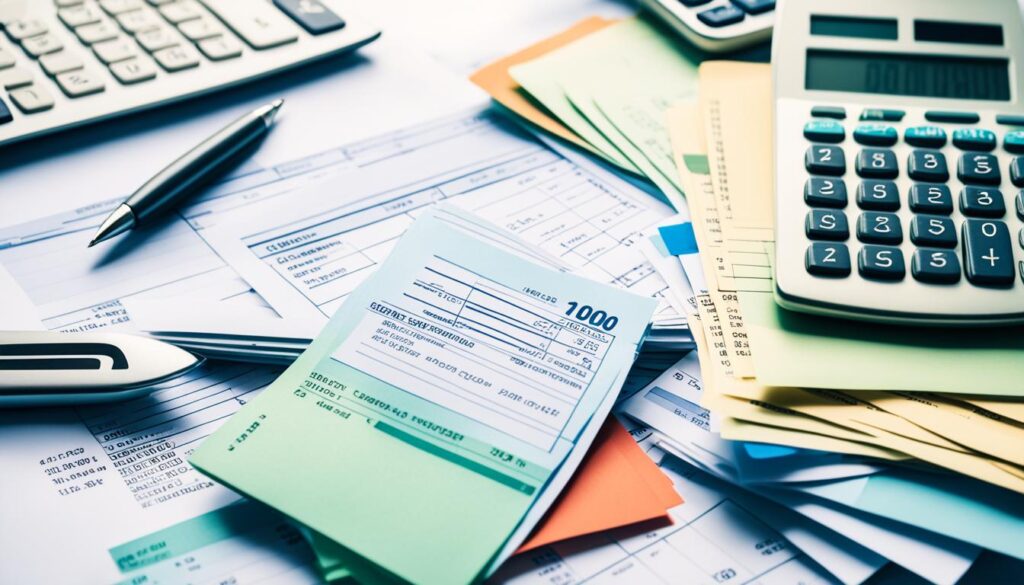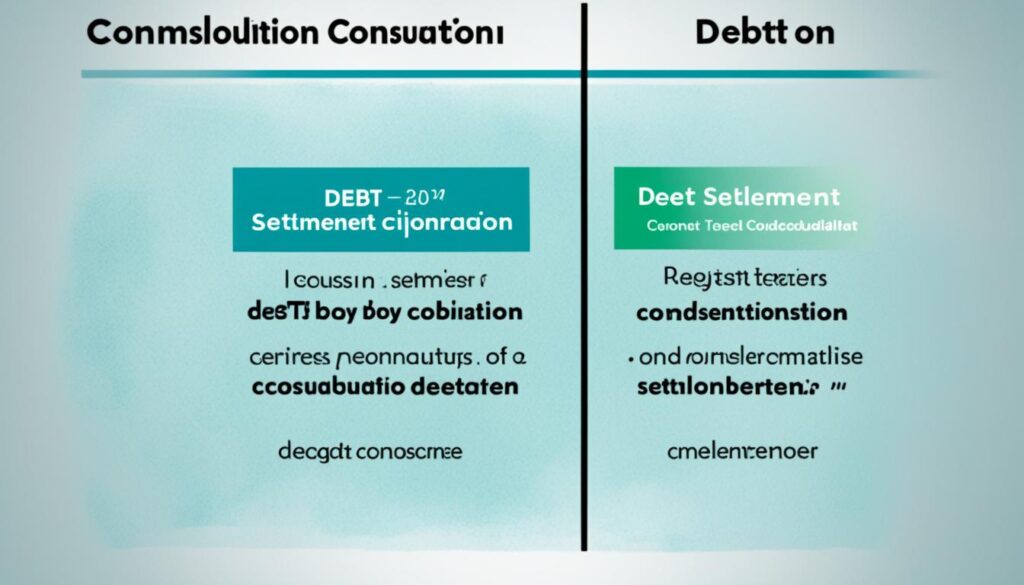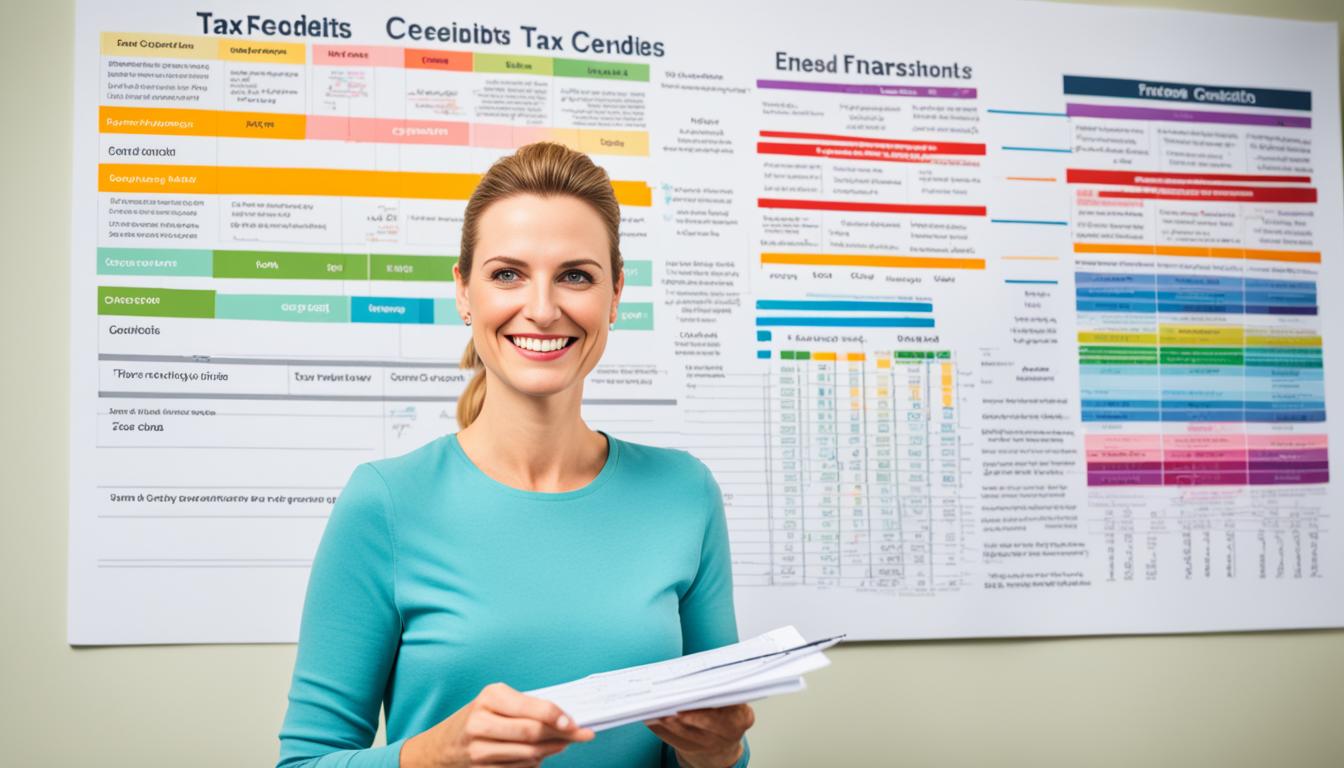Debt consolidation combines several high-interest debts into one easier payment. It helps manage your money by cutting down on different rates and due dates. With Debt Consolidation Options, you can lower your monthly payments and better your credit.
Sites like NerdWallet offer great tools for better financial understanding. They help track your credit and spending. Knowing when to consolidate is key. It depends on your income, credit score, and cash flow. This method can help you pay off debt faster and improve your financial health.
What is Debt Consolidation?
Debt consolidation combines many debts, like credit card bills, into one payment. It lets people combine loans with different rates into one plan. Often, this leads to lower payments.
Credit card rates are usually around 21 percent. Personal loans are around 11.93 percent. For those with great credit, rates can be as low as 6.5 percent. By consolidating loans, debt feels less overwhelming.
There are many ways to help with debt consolidation.
- Balance transfer credit cards usually have a 3 to 5 percent fee but offer 0% interest at first.
- Home equity loans have bigger amounts, lower rates, and longer payback times than most loans or cards.
- Peer-to-peer and debt consolidation loans can range from $1,000 to $100,000 and $25,000 to $50,000.
Managing debt well means understanding how it affects your money and credit score. Since payment history is 35 percent of your credit score, and it’s best to keep credit use under 30 percent, consolidating loans can help. It might improve your financial health.
Besides consolidating loans, there are debt management plans. These aren’t bankruptcy. They make debts easier to handle, often with lower rates. This helps pay off debts quicker and eases financial stress.
With lower payments and a simpler repayment process, debt consolidation is a helpful tool. It’s good for anyone wanting to make their finances simpler and take charge of their debt.
Benefits of Debt Consolidation
Debt consolidation makes handling debt relief easier. You might get better interest rates and manage debts simpler. When you roll multiple debts into one, you get one fixed payment. This makes budgeting each month easier.
One big plus is lower interest rates. For instance, a balance transfer card may offer 0% APR for a bit. This deal lasts from six months to two years. This means you’ll pay less interest. Also, a better credit score since getting your loans could get you even better rates. In the end, you save a lot over your loan’s life.

It also makes handling money simpler. You switch many payments into just one. So, instead of many bills, there’s just one bill each month. This simpler debt management cuts down stress. Plus, it’s easier to track what you owe each month.
Another perk is lowered monthly payments. By combining debts, the loan term might stretch out. This means payments are more spread out. Yes, this could mean more interest over time. But, the smaller monthly payments could help people right now. It makes the financial load lighter.
This debt relief option is great for financial health and better credit scores. Keeping up with payments and using credit wisely boosts your score. A higher credit score opens the door to better credit offers later.
Yet, think about any downsides like fees for starting or transferring balances. Also, your credit score could dip briefly from the checks made. But, weighing your choices carefully can lead to smarter financial moves. It can help secure a stronger money future.
Drawbacks of Debt Consolidation
Debt consolidation can make managing money easier. But, it can also lead to higher costs. This comes from fees and possible higher interest rates over time. Thus, the total debt might end up costing more than expected.
Getting consolidation advice is super important before deciding. It’s key to know how it might affect your credit score. For example, a higher interest rate on a new loan could lessen its financial benefits.
There’s a big risk of getting into more debt too. If old spending habits don’t change, new debts could pile up. This can make someone stuck in a cycle of borrowing and repaying.
Also, lowering monthly payments might mean paying more interest in the long run. So, careful evaluation and smart consolidation advice are critical. It’s important to consider these drawbacks carefully.
In the end, debt consolidation has its ups and downs. Knowing the risks of more debt and effects on credit is important. Making a good choice can really help your financial future.
Comparing Debt Consolidation to Debt Settlement
It’s important to know the key points about debt consolidation versus debt settlement when managing debt. Each solution has different methods and effects.
Debt consolidation means putting all your debts into one new loan or a balance transfer card. This usually gives you lower interest rates. Also, you will only have to make one monthly payment.

Debt settlement, however, is about talking with creditors to pay less than what you owe. This can really hurt your credit score. It’s because you’re not paying the full amount you owe.
Let’s look more closely at each option:
- Debt Consolidation:
- Turns many debts into a single loan
- Gives you lower interest rates
- You will have just one payment each month
- Your credit score might get better over time
- Debt Settlement:
- You end up paying less than the owed total
- This can make your credit score drop
- There might be fees and tax stuff to think about
Choosing between debt consolidation and settlement depends on your financial needs. If you want lower interest rates and easier payments, consolidation is the way to go. But if cutting down the amount you owe is the main goal, consider settlement, even with its credit risks.
Debt Consolidation Options
Looking into Debt Consolidation Options is key. There are many, each with its own perks.
A great choice is the balance-transfer credit card. It often has 0% interest at first. This is good for those with strong credit who can pay quickly. Yet, these cards might have fees, and if not paid on time, costs go up.
A fixed-rate debt consolidation loan makes things simpler. It combines your debts into one payment. Rates are around 11.93%, but can drop to 6.5% with top credit. Loan amounts vary, offering flexibility. Yet, watch out for fees like origination or late charges.
Home equity loans and HELOCs allow for bigger loans. Your home is used as collateral here. These have longer processes and repayment times. They fit those with lots of home equity, wanting a long-term plan.
Peer-to-peer (P2P) loans offer $25,000 to $50,000 typically. They even consider lower credit scores. The application doesn’t impact your credit score much, making it a friendly choice.
If new loans worry you, consider a debt management plan. It doesn’t need a new loan or card. Instead, it works to lower your interest rates and payments with creditors.
Each Debt Consolidation Option has its pros and cons. Thinking about your finances and goals will guide you to the right choice.
How to Consolidate Your Debt
Learning the steps to consolidate debt is key for managing finances easier. Using a 0% interest balance-transfer credit card is one method. It lets you move high-interest card balances to a no-interest card for a time. You need good credit to do this.
Another choice is getting a fixed-rate personal loan. Such loans can combine several debts into one easier payment, often with lower interest. Here are steps to begin:
- First, check your credit score. A better score helps get a loan with good terms.
- Then, look for and compare loan rates from different sources. Finding the best terms is key.
- Next, apply for the loan. Make sure you have your income proof, ID, and debt list ready.
- If necessary, get help from credit counseling. They offer advice on managing money and creating a budget.
Before you consolidate debt, think about your financial health. Starting an emergency fund is smart to cover surprises. This helps you avoid new debts. Also, budget carefully to watch spending and make debt consolidation work.
When is Debt Consolidation a Smart Move?
Making smart consolidation decisions starts with looking at your money. If your debt payments each month are less than half of what you make, that’s good. Also, having a high credit score helps get low-interest rates for a smoother loan plan.
Debt consolidation works well if you have a steady income to pay bills on time. It’s important that you can pay off the new loan quickly. By getting lower interest rates and simpler payment plans, managing money becomes easier. This helps in becoming debt-free without extra stress.
Risks of Debt Consolidation
Debt consolidation has many good points, but also some risks to think about. Doing a financial risk assessment is key. This helps see if a new loan is a good idea for you. A big risk is higher interest rates for those with lower credit scores. As of May 2024, credit card rates are at 20.66 percent on average. Personal loan rates sit at 12.22 percent. Even though personal loan rates are lower, checking these rates is important. You don’t want to end up in high-interest rate consolidation loans that don’t help.
Merging debt means your credit score might drop a little because of a hard credit check. Payment history is huge, making up 35 percent of your score. Missing payments can lead to fees. But paying on time can help your score. Late payments, 30 days overdue, can hurt your score a lot. So, staying current is a must.
There’s also the risk of falling back into old spending habits. If you don’t fix the cause of your debt, you could end up worse off. Thinking about what you need and your goals can help find the right path. For a deeper look at debt consolidation’s pros and cons, see this detailed analysis.
Lastly, think about how consolidation affects your credit. Debt against your credit cards counts for 30 percent of your score. How long you’ve had credit counts for 15 percent. Consolidating can make payments easier to manage. But, you need discipline for on-time payments. A stable cash flow and avoiding late payments can boost your score. Always assess the credit score risks before you decide.
How Debt Consolidation Affects Your Credit Score
Knowing how debt consolidation impact affects your credit score is key. Applying for a debt consolidation loan might slightly drop your score at first. This is because of the hard credit checks done. But, this drop is usually short-lived.
One major thing that affects your score is credit utilization. By consolidating debts, you can lower your card balances. This helps to reduce your credit use ratio. A lower ratio is good and can improve your credit score over time.
Payment history is also crucial. Debt consolidation makes repaying debt easier by merging several payments into one. This simplifies managing payments and helps ensure they’re made on time. Making payments on time is key to keeping and boosting your score.
After combining your debts, it’s wise to keep old credit accounts open. This can help your credit history and utilization. It adds positively to your credit score improvement.
In short, though debt consolidation may lead to a brief score drop, its long-term benefits can be great. It positively impacts many parts, from credit utilization to payment history.
Additional Tips for Managing Debt
Managing debt well means you need to use many strategies. First, make sure you budget well. This means you should make sure you don’t spend more than you earn. Keeping track of your money and focusing on what you really need helps you plan. This plan stops you from wasting money and gets you ready for surprise costs.
It’s very important to have an emergency fund. This fund stops you from getting into more debt when unexpected expenses pop up. By saving a little bit of your money often, you can build a safety net. This safety net protects you from surprise bills.
Be careful when you think about putting all your debts into one. Make sure it doesn’t come with hidden fees. There are good options out there that don’t cost more. Also, keep learning about how to handle money better and don’t hesitate to get advice from experts. This helps you make smart choices about paying off your debts.
Using these tips can help you lower your debts and teaches you how to spend wisely. By budgeting carefully and having an emergency fund, you’re on your way to living without debt. This way, you’re taking big steps towards a future with no debts.




